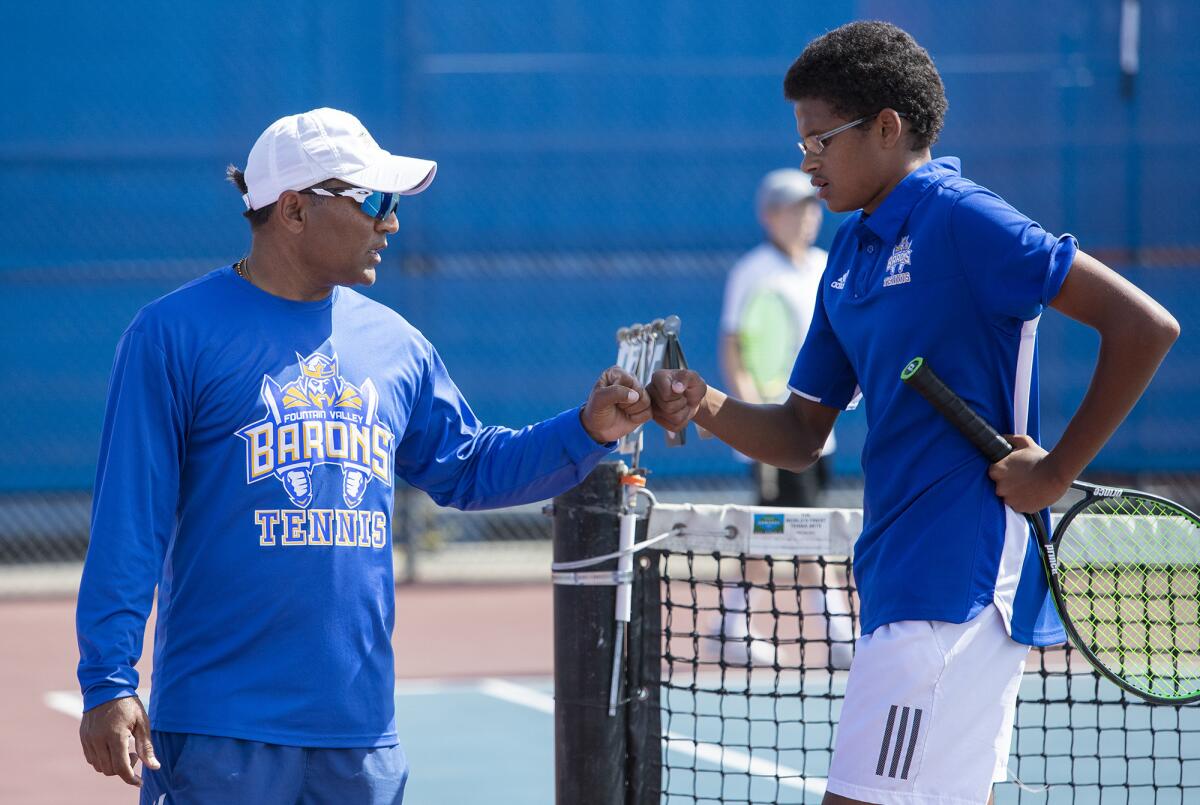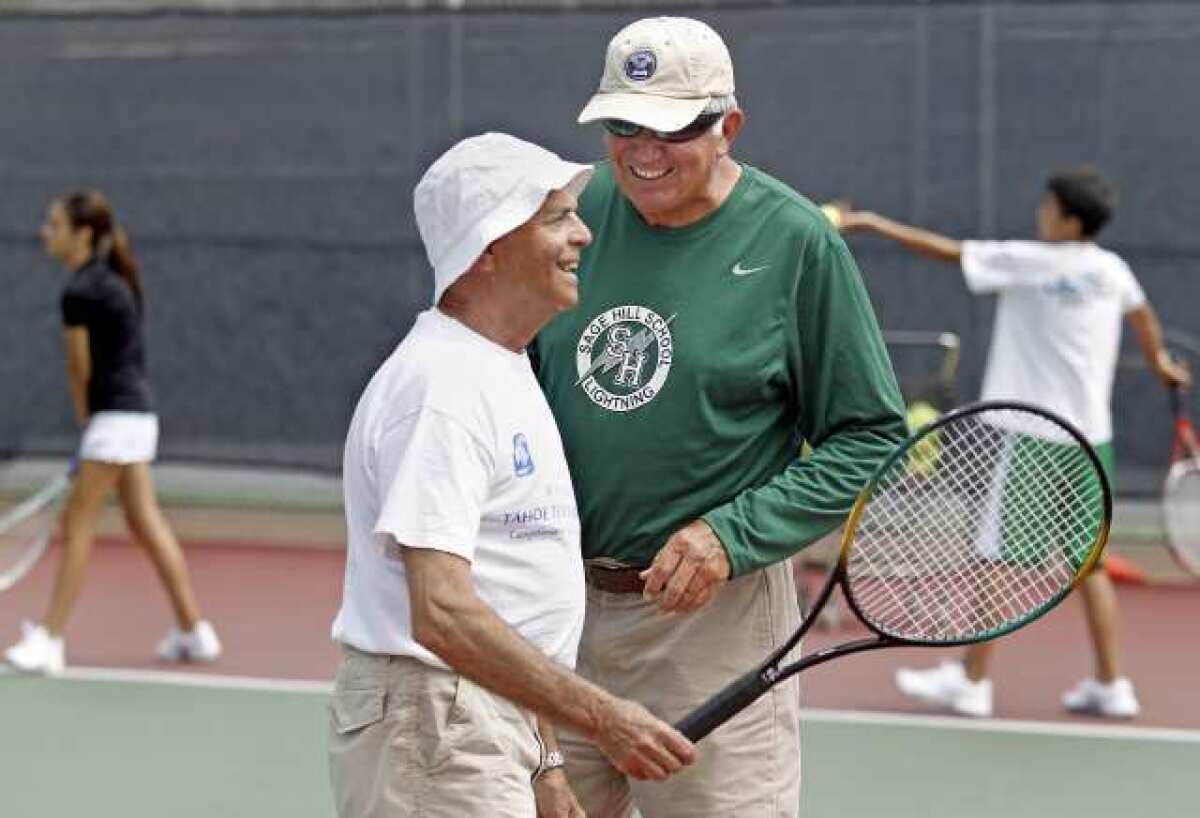Local tennis coaches react to COVID-19 shutdown

Tennis appeals to the masses as a global sport that can be played for life.
Its greatest adversary right now is the coronavirus, which has brought the sports world to a screeching halt.
That has been problematic for those who have given much of their lives to tennis.
Harshul Patel coaches both the boys’ and girls’ tennis teams at Fountain Valley High. He has three kids, and he is the only working member of his household, so the 44-year-old coach is yearning to get back to work.
“I always ask the question, ‘How long am I not going to work? How long am I not going to step on the court and not do the lesson?’” Patel said. “That’s the question I’m going to ask the expert. What are we going to do about my family and my kids?”
It has been a month since high school sports were sent to the sideline due to concerns over the coronavirus.
Apart from high school, though, tennis is played year-round in tournaments. Patel said that he had four USTA-sanctioned tournaments — two each at Level 6 and Level 7 (for beginners) — that he had planned to host that have since had to be canceled.
The tournaments raise revenue for the Fountain Valley tennis program, which helps provide financial assistance for student-athletes in need. Team costs average roughly $540 per player.
The money goes towards a home and away uniform (two hats, two polo shirts, two T-shirts, two pairs of shorts), court shoes, six pairs of socks, a sweatshirt, a sweatband, practice and game balls, the team banquet and stipends for two assistant coaches.
Additionally, the tournaments provide an opportunity for Patel’s players to pick up community service hours.
“What we do is we offer them volunteer work for their community hours,” Patel said. “Kids can come out and watch the lines. Instead of going to the hospitals or doing some nonprofit, they are coming out and they help with watching the lines and kind of help them out.
“Level 7 tournaments, we don’t require a linesperson from USTA, so what we do is we put them to work for volunteer hours.”
Time on court may not be possible right now, but Patel is trying to see the lighter side of the situation. He has seldom had time off as a tennis coach.
“I’m relaxing,” Patel joked. “If they’re saying, ‘Don’t go out of the house,’ that’s perfect. I’m lying down.”

A.G. Longoria, 74, is deeply connected to area tennis as the first coach of the Sage Hill tennis program. He is now coaching at Laguna Hills, which was ranked in the CIF Southern Section’s initial poll for Division 5.
Longoria said that he felt bad for seniors who had worked hard towards a goal of winning a CIF championship, which was something he felt his team was ready to do after four years of hard work.
When racquet clubs shut their doors, Longoria was still getting requests from his players for court time. Initially, Longoria said he would unlock the courts at Laguna Hills High for his players.
School facilities are no longer an option, and Longoria added that some cities have taken down the nets on their tennis courts.
Longoria, who is the executive director for the California High School Tennis Coaches Assn., noted that tournament players are aplenty at the top of high school tennis lineups, and the shutdown raises cause for concern for those trying to catch the eyes of college programs.
“They are really scrambling because this also affects the kids,” Longoria said. “If you’re a junior in high school, … this is the year that you’ve got to really do well in USTA so that you can get on the radar, if you’re planning on trying to play college tennis.”
The 118th annual USTA Southern California Junior Sectional Championships, hosted by the Los Caballeros Racquet and Sports Club in Fountain Valley, are scheduled to begin on June 13.
Longoria said that even if the coronavirus pandemic lingers on, the advantage that tennis would have is that players could be playing relatively quickly. He drew a comparison to football, where teams begin training in the spring to get in shape and help prevent injury.
“Tennis, at least, if they say on Aug. 15 that we can play, we all have summer offseason training to get ready,” Longoria said regarding the girls’ tennis season in the fall. “Even though everybody will be pretty raw and not doing well, we can start up in a hurry.”
::
Support our sports coverage by becoming a digital subscriber.
For more sports stories, visit latimes.com/socal/daily-pilot/sports or follow us on Twitter @DailyPilotSport.
All the latest on Orange County from Orange County.
Get our free TimesOC newsletter.
You may occasionally receive promotional content from the Daily Pilot.




